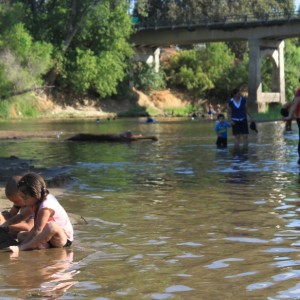Federal Water Tap, April 28: Release Dates Set for Major Agriculture, Climate, Water Reports
Air, land, and water. Greek elements each, the basic substances of life will have a turn in the American spotlight in the coming weeks and months.
First in line is land. Data from the 2012 Census of Agriculture will be released online May 2. Published every five years, the census is the most comprehensive picture of U.S. farm production, practices, and rural economics.
Next comes air. The third National Climate Assessment is nearly complete. Members of the assessment’s advisory committee – a mix of experts from academia, the public sector, and the private sector – will hold a public teleconference May 6 to sign off on the document.
“If they approve it, the assessment will be sent to the government,” Glynis Lough, chief of staff for the National Climate Assessment, told Circle of Blue.
The draft report, published in January 2013, asserted that “climate change is already affecting the American people.”
Last of all is the U.S. Geological Survey’s report on water use. Published every five years, the 2010 edition is overdue. The report is expected in early November, Ethan Alpern, USGS spokesman, told Circle of Blue.
The delay is due to new methods for calculating the water used by power plants.
More Water for Denver
To increase supplies in the northern branch of Denver’s two-pronged water delivery system, the Army Corps of Engineers recommends expanding an existing reservoir and filling the extra space with water from creeks on both sides of the Continental Divide, according to a final environmental review.
By 2032, Denver wants to add 18,000 acre-feet of reliable water, roughly 8 percent of current demand. The corps, which was in charge of the review because more than 9 acres of wetlands would be filled or flooded, recommends raising Gross Reservoir’s dam by 131 feet, which would nearly triple its storage capacity. Denver would then divert water from creeks that flow into the Colorado River and the South Platte River.
To clear a political path for the $US 360 million expansion, Denver signed an agreement in 2012 with water users on the west side of the Rockies that allocates a portion of the reservoir’s water to river flows.
Comments are being accepted on the final review through June 9. They can be sent to moffat.eis@usace.army.mil.
Using Recycled Municipal Water to Grow Food
In a reversal, farmers in California’s San Joaquin Valley are looking to cities for additional water supplies.
The Bureau of Reclamation will lead an environmental review of a project that would send 59,000 acre-feet of treated water from municipal sewage plants in Modesto and Turlock to the Del Puerto Water District, which serves irrigators. Some of the water will also be available for wildlife refuges in the valley. The trend typically runs the opposite direction – cities buying water from farmers.
Comments on the scope of the review should be submitted by May 28 to blawrence@usbr.gov.
Boise River Review
Reducing flood risks and increasing water supplies are two goals for the Boise River watershed, where nearly 40 percent of Idahoans live. The Army Corps of Engineers will begin an environmental review to assess how to meet those objectives. Potential actions include raising the height of a large dam on the river and using an aquifer to stored water underground.
To submit comments on the scope of the review, contact BoiseGI@usace.army.mil.
Testing the Legal Deadlines for Contamination Lawsuits
The U.S. Supreme Court is hearing a case that questions the time limits that North Carolina places on lawsuits involving environmental damages, USA Today reports.
State law says that plaintiffs have a 10-year window to file claims, a window based on when the contamination occurred and not when it was discovered.
Federal Water Tap is a weekly digest spotting trends in U.S. government water policy. To get more water news, follow Circle of Blue on Twitter and sign up for our newsletter.
Brett writes about agriculture, energy, infrastructure, and the politics and economics of water in the United States. He also writes the Federal Water Tap, Circle of Blue’s weekly digest of U.S. government water news. He is the winner of two Society of Environmental Journalists reporting awards, one of the top honors in American environmental journalism: first place for explanatory reporting for a series on septic system pollution in the United States(2016) and third place for beat reporting in a small market (2014). He received the Sierra Club’s Distinguished Service Award in 2018. Brett lives in Seattle, where he hikes the mountains and bakes pies. Contact Brett Walton




Leave a Reply
Want to join the discussion?Feel free to contribute!